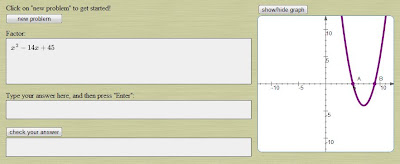Mathmo is a review tool for A-level maths developed by the NRICH project at the University of Cambridge. It is advertised to work in Chrome, Safari, and on mobile devices. There are questions on wide range of topics in a typical American high school curriculum, though the range of question types within a topic is very limited. In some topics (logarithms, for example) there are a few different types of questions, but in most there is a single question type where just the specifics (numbers, functions, etc.) vary. You can ask for random questions from the wide range of syllabus topics or can choose your own specific topics to build up a set of questions. You work the problems on paper (or in your head) and then push the check answer button to compare your answer with the given one. If you want several questions on the same topic, you can add the topic multiple times to your question list or can click the new button from within a particular question.
I did experience a couple of minor bugs. Sometimes, the first time you look at a question you see the code rather than the mathematical notation. Clicking (or tapping) the question changes the code to notation. The description says that the color of the question changes once you indicate whether you got the question right or wrong. I didn't experience that either on the iPad or in Chrome.
Showing posts with label collection. Show all posts
Showing posts with label collection. Show all posts
Friday, March 22, 2013
Thursday, July 7, 2011
A First Course in Algebra
 Dr. Carol J. V. Fisher has created a thorough online Algebra 1 course complete with interactive exercises for every topic. You can also choose to have a worksheet of practice problems and answers generated. I haven't explored the site that thoroughly yet, but there's a link to a beautifully formatted pdf text for each topic and the interactive web exercises are of good quality. I love that there's an option on the trinomial factoring problems to show the graph of the associated quadratic function!
Dr. Carol J. V. Fisher has created a thorough online Algebra 1 course complete with interactive exercises for every topic. You can also choose to have a worksheet of practice problems and answers generated. I haven't explored the site that thoroughly yet, but there's a link to a beautifully formatted pdf text for each topic and the interactive web exercises are of good quality. I love that there's an option on the trinomial factoring problems to show the graph of the associated quadratic function!There are also lots of interactive exercises for Geometry and Algebra 2.
Sunday, January 30, 2011
GeoGebra Calculus Applets Project
This is a collection of applets created by Marc Renault of Shippensburg University. Marc's "goal is to make a complete library of applets for Calculus I that are suitable for in-class demonstrations and/or student exploration."
Thursday, July 31, 2008
David Young's Interactive Mathematics Resources

David Young has developed a high quality collection of interactive resources, primarily, but not solely, for algebra and pre-algebra. My favorites are the Graphing Linear Equations modules, which teach and then provide guided practice in graphing by plotting points, graphing using intercepts, and graphing using the slope-intercept method. A student worksheet to go along with these modules is provided as well. There's also lots worth exploring here beyond the applets. For example, there is a nice PowerPoint template for Jeopardy-style review and a video which shows you how to create your own applet using the free and versatile Geogebra.
Saturday, July 26, 2008
Interactive Algebra Practice

This site offers an easy to use interface for practicing a fairly wide variety of math topics. I especially like the "graphing" and "formulas" in the algebra section. In these problems, if you choose a difficulty level of 5 or higher you can choose linear graphs, quadratic graphs or a mix. When you have finished the set number of problems, you have the opportunity to redo the problems you got wrong.
Tuesday, July 22, 2008
Sunday, July 20, 2008
Transum Software
This site has some good interactive activities appropriate for students in roughly grades 3 through 10. By clicking on the images here, you can experiment with those that I am most likely to use with my Algebra 1 class.
Sunday, July 22, 2007
EquationPlotter

Created at The Lawrenceville School, this is a great web-based tool for high school math teachers. It enables you to produce high quality, highly customizable graphs which can be integrated beautifully into word processing documents. In addition, the site includes many excellent demonstration applets of topics ranging from the unit circle to solids of revolution. Free registration is required to produce the graphs (but isn't needed to access the applets).
The National Library of Virtual Manipulatives
 This site from Utah State University has a nice collection of accurately named virtual manipulatives that can be used in K-12 math education. These are organized both by mathematical topic and by potentially appropriate grade level. I would say that the target audience for most is probably grades 3-8, but there are some which can be used by younger or older students. Each manipulative has clear instructions and notes for the teacher or parent. Many also have associated activities which can be accessed at the click of a button.
This site from Utah State University has a nice collection of accurately named virtual manipulatives that can be used in K-12 math education. These are organized both by mathematical topic and by potentially appropriate grade level. I would say that the target audience for most is probably grades 3-8, but there are some which can be used by younger or older students. Each manipulative has clear instructions and notes for the teacher or parent. Many also have associated activities which can be accessed at the click of a button.
Subscribe to:
Posts (Atom)









